![[Discontinued] FIRST for international students](/abroad/program/id2/abroad_pg_id2_tmb.jpg)
[Discontinued] FIRST for international students
- Cross-Cultural Communication Opportunities
With the establishment and expansion of our programs, this program will not be offered from AY 2024. Please see the syllabus and application information for the implementation in AY2023 here.
FIRST is a four-day, three-night program that offers first-year students the opportunity to spend the break between quarters*1 to travel to other parts of Japan or overseas and directly experience Asian culture and society by interacting with local people and conducting field research. The FIRST Program is held twice a year: once in another country for domestic students in the spring and once in another part of Japan for international students in the fall.
Deciding destinations by drawing straws!
The biggest feature of the FIRST Program is the hands-on approach to conducting research in an unfamiliar land, culture and language. Destinations in Kyushu are decided by drawing straws.
Meet with more than 200 Japanese people in four days!
While on FIRST, students need to interview approximately 200 people in four days. The program is designed to teach students how Japanese people think and behave, as well as the significance of living in Japan, studying Japanese culture, and learning the Japanese language. Even though this is a short program, students can improve their Japanese skills by conducting research that entails active exchange with Japanese locals.
Experience the charm of Japan not found in major cities
The program will be conducted in four prefectures in Kyushu. Hospitality, nature, food, and places where Japan’s history and tradition have been beautifully preserved— these are a few among countless things that make Kyushu one of the most attractive places in the country. Each prefecture is unique—Oita, with its pristine and beautiful nature and yielding an abundance of hot spring water unrivaled in the country; Nagasaki, with its historic port, the only one open for foreign trade during the country’s period of isolation, that continues to provide a glimpse into foreign cultures; Saga, known for its exquisite pottery from towns such as Karatsu, Imari, Arita, and hot springs in Takeo and Ureshino; and finally; Fukuoka, home to the biggest city in Kyushu, known for its shopping districts and delicious foods, such as “yatai ramen” (street stall ramen noodles) and “motsunabe” (tripe hot pot). During the program, participants also have a chance to visit smaller towns that are not commonly known to foreign tourists.
After you enter APU, the FIRST Program will offer you an opportunity to step outside of the multicultural campus, and this will enhance your understanding of what it means to learn at APU while giving you a global perspective. To date, a large number of students have gotten a taste of the outside world by joining this program.
The biggest feature of the FIRST Program is intercultural orienteering. For this activity, students divided into small groups and equipped with only the bare minimum of language training must make their own way to a designated destination. There, they must use teamwork and take initiative to conduct surveys while seeking help from local people. By doing this, students can meet over 200 people, which helps them develop confidence and a proactive attitude. Although senior students from the destination country accompany the program students, it is the students who take center stage.
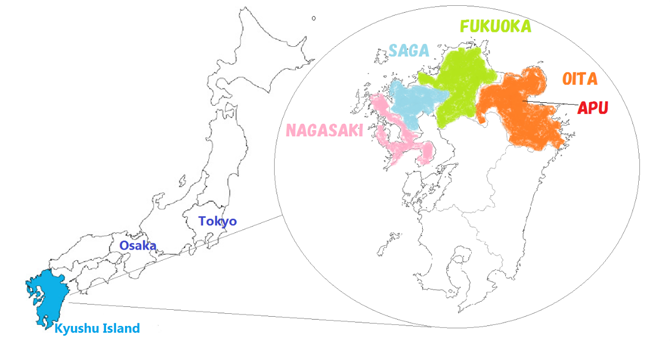
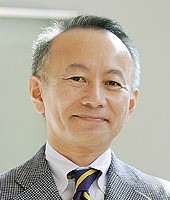
Thanks to the FIRST Program, many students develop an interest in studying outside the campus and go on to join a number of overseas programs, including language training programs, faculty-led field trips, and student exchange programs. At APU, the FIRST Program is your first chance to discover your door to the outside world.
Professor KONDO Yuichi
College of Asia Pacific Studies
Director, AY2018 FIRST Program
The FIRST Journey
The program consists of pre-program sessions, field research, and post-program sessions.
1. Pre-program sessions (one month prior to departure)
Under the guidance of faculty members, students decide their research topics, receive crisis management guidance, and prepare themselves for departure. Each group of students is assigned one senior TA to assist with language and cultural studies. At the pre-program sessions, participants begin by choosing research topics, reserving accommodations, and independently going through the various steps of field research.
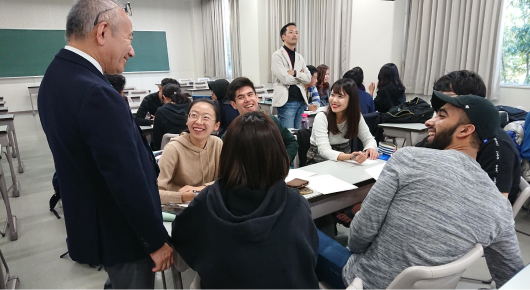
2. Field research (4 days)
Destinations are determined by drawing straws. Armed with a map, a few words of Japanese, and teamwork, the groups set off for their respective destinations.
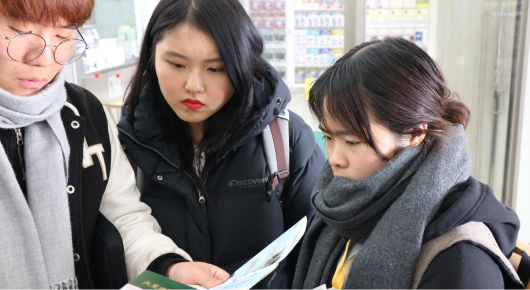
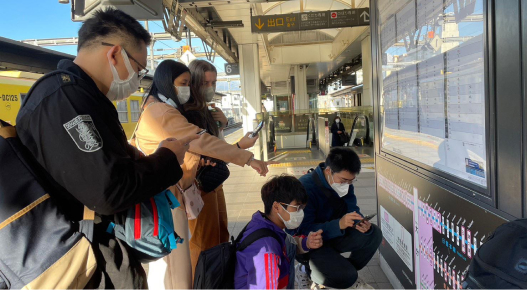
3. Arriving at the target destination
Upon arrival, students begin their research based on the topics decided prior to departure. They will need to approach approximately 200 people to complete their 100-page-plus questionnaires.
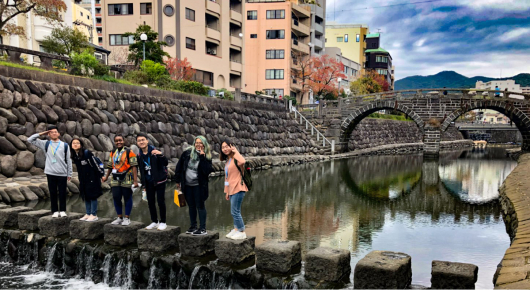
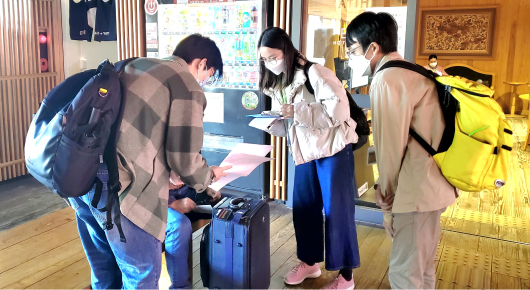
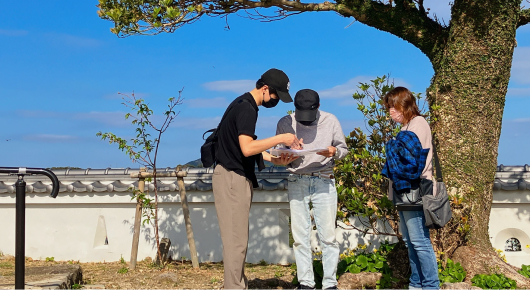
4. At the end of the day
Students look back on the day’s events, share their thoughts and reflections, and prepare for the next day.
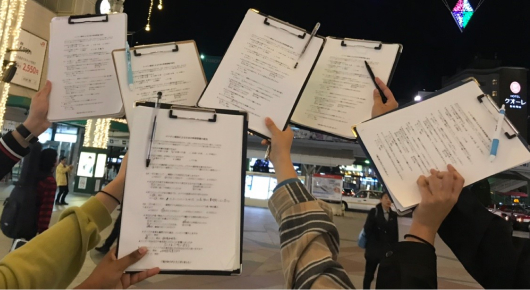
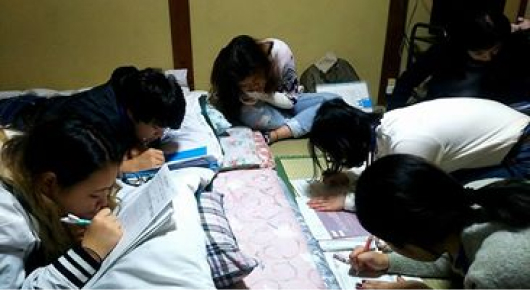
5. Post-program session
Upon returning to APU, students present the results of their research and receive feedback from their professors. By participating in this program, participants can develop intercultural communication skills and discover a direction for their studies at APU.
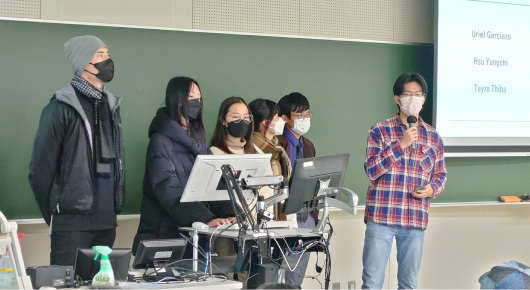
*1 The quarter system
The APU academic calendar is divided into two semesters, and each semester consists of two quarters (each lasting approximately eight weeks) and an intensive two-month session. Classes held during the quarters are offered twice a week and are completed in two months. This intensive calendar structure ensures positive learning outcomes and encourages students to apply themselves to their studies. Breaks are held between quarters during which time classes are not held. APU offers several intensive study abroad opportunities that students can take advantage of during these quarter breaks.
【 The APU Academic Calendar 】
| Apr | May | Jun | Jul | Aug | Sep | Oct | Nov | Dec | Jan | Feb | Mar |
|---|---|---|---|---|---|---|---|---|---|---|---|
| Spring Semester | Fall Semester | ||||||||||
| 1st Quarter | 2nd Quarter | Summer Session | 1st Quarter | 2nd Quarter | Winter Session | ||||||



